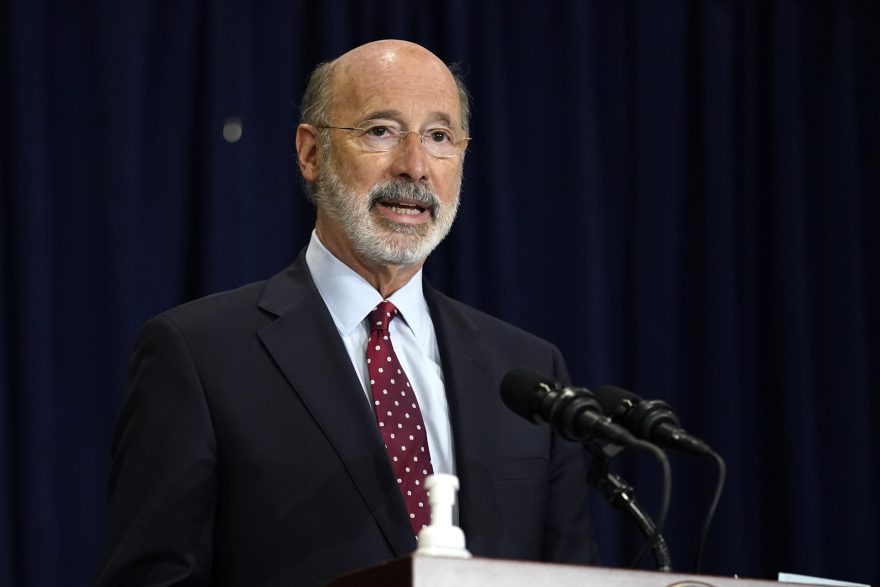Pennsylvania Governor Pitches School Funding Overhaul

A number of governors have called for boosting education spending for the coming year’s budget, betting that the economy will lift their states’ revenues. Pennsylvania Gov. Tom Wolf has proposed an ambitious increase of his own, one that hinges not on economic conditions, but rather an overhaul of how the state funds schools.
The second-term Democrat says his plan would result in $1.3 billion more in aid flowing to K-12 schools across the state, through a combination of tax increases and a reworking of Pennsylvania’s school finance system.
Even strong supporters of the plan, however, say it faces tough odds in the state’s Republican-controlled legislature, at least in its current form.
The core of Wolf’s proposal is a change to the method through which Pennsylvania funds schools. The state currently has a funding formula that was designed, in theory, to support underfunded districts. But only a small portion of the overall money flowing to K-12 systems, about 11 percent — by the governor’s estimate — goes through the formula, and the remainder is allocated separately, through a method that school officials say is tethered to antiquated school enrollment counts.
Wolf’s proposal would route all of the state’s basic education funding, which now stands at $6.2 billion per year, plus an additional $200 million he’s proposed for next year, through the funding formula.
The governor says the existing funding approach has punished tax-poor school systems and does not allow most of them to account for changes in enrollment and other costs that have spiraled over time. He has vowed that “no school will lose a single dollar” in state resource as a result of the change.
But it would require new revenue, and Wolf is calling for an increase in the personal income tax from 3.09 percent to 4.49 percent. It would shift the tax burden away from lower-income earners and increase them on those with higher pay, by adjusting exemptions.
“Pennsylvania’s school funding system is unfair to students, teachers and communities,” Wolf said in a statement. “The state still largely funds schools based on student enrollment from 30 years ago, which underfunds growing districts from our small towns to our big cities. My common sense plan restores fairness to school funding to ensure every community can provide the quality education students need to succeed in life.”
Eye on Personnel
GOP legislators, however, appear to be lining up in opposition to Wolf’s plan, arguing that it will hurt businesses and a state economy attempting to recover from the pain of COVID.
“The pandemic hit Main Street. More than anyone else they had to deal with the governor’s draconian shutdowns and now he wants to put more burden on them the largest tax increase in Pennsylvania history,” said Republican Senate President Pro Tempore Jake Corman, according to the Tribune-Review.
“The mom-and-pop stores will bear the brunt of this proposal,” Corman said. “Small employers and middle-class families are what drive economic recoveries. Governor Wolf has put yet another target on their backs.”
Mark DiRocco, the executive director of the Pennsylvania Association of School Administrators, said he did not expect Wolf’s proposal to make it across the finish line in its existing approach, despite Republican opposition.
“This has been an historic ask, and we don’t know where it’s going to go,” DiRocco said.
But many of his organization’s members – mostly top K-12 district administrators – are convinced that a change in the funding system is long overdue. Many districts across the state struggle to keep up amid a raft of costs that rise, year after year – in serving populations such as special needs students and English-language learners, and in shifting enrollment. The current funding scheme, he said, does little to help.
Emergency federal aid to schools, the latest round of which was signed into law by former President Donald Trump in late December, has bolstered Pennsylvania’s districts, and so would additional aid proposed by President Joe Biden if it comes through, he said.
But much of that aid has supported one-time purchases, such as COVID-related safety equipment and laptops. Changing the funding formula would get at districts’ underlying, core expenses, particularly around paying for personnel, said DiRocco. His organization’s 900 members say they have a particular need for mental health specialists, such as school psychologists and counselors, as well as staff who can address learning loss.
Wolf’s plan “starts the conversation,” he said, “and most of our members want to be part of that conversation.”
Photo: Pennsylvania Gov. Tom Wolf at a news conference in November, by AP Photo/Julio Cortez.
See also:
